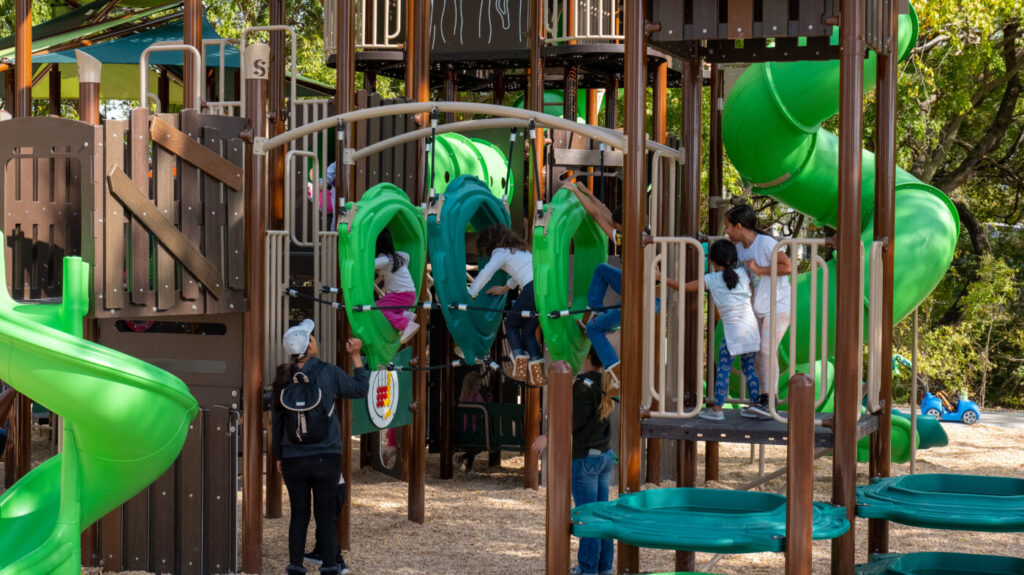How Playground Equipment Fosters Social Interaction and Cooperation in Children
At Hunter Knepshield, we understand that playgrounds are far more than places for children to burn energy—they’re vital environments where young minds develop essential life skills through play. For decades, we’ve been dedicated to creating thoughtfully designed playground spaces that serve as natural laboratories for social development, where children learn cooperation, communication, and empathy through meaningful interactions with their peers.
Our expertise in playground design goes beyond safety standards and engaging equipment; we focus on creating environments that naturally encourage positive social behaviors and collaborative play. Every slide, climbing structure, and interactive element we install is carefully selected to promote the kind of unstructured play experiences that research shows are crucial for healthy social development. Whether we’re designing spaces for schools, parks, or community centers, our commitment remains the same: creating playgrounds that foster the social skills children need to thrive in an increasingly interconnected world.

Building Social Skills Through Thoughtful Playground Design
Modern playground equipment serves as a powerful catalyst for social development, with research consistently showing that outdoor play environments promote significantly more social interaction than indoor classroom settings. The magic happens when children encounter playground features that naturally require cooperation, communication, and shared problem-solving to fully enjoy the play experience.
Multi-level climbing structures exemplify this principle perfectly. These complex play systems require children to work together to navigate obstacles, share space, and coordinate their movements. Unlike solitary activities, these structures become natural meeting grounds where children must communicate, negotiate, and collaborate to succeed. The shared challenge creates instant bonds between children who might otherwise never interact.
Seesaws and cooperative equipment take this concept further by making collaboration essential for play. Children quickly learn that the equipment won’t function without a partner, teaching fundamental lessons about interdependence and teamwork. These experiences translate directly into improved social skills as children practice taking turns, communicating their needs, and working together toward common goals.
Playground Features That Encourage Teamwork
Certain types of playground equipment are specifically designed to promote collaborative play and group interaction. These features create natural opportunities for children to work together and develop essential social skills:
• Sandbox areas and water play features – Create natural gathering spaces where children engage in cooperative building projects, sharing tools and materials while working toward shared creative goals
• Group swings and multi-person spinning equipment – Introduce children to synchronized movement and shared responsibility
• Interactive music and sensory play panels – Encourage children to work together to create sounds, explore textures, and engage in imaginative scenarios
Research from the University of Washington demonstrates that synchronized movement helps young children develop collaborative skills, as moving in unison enhances their ability to engage with one another and cooperate effectively. These features often become the foundation for elaborate group games that require negotiation, rule-setting, and conflict resolution.
Communication Skills and Emotional Development
Playgrounds serve as dynamic communication hubs where children constantly practice both verbal and non-verbal interaction skills. The unstructured nature of playground play creates countless opportunities for children to express their ideas, negotiate rules, and resolve conflicts independently.
Key areas where communication skills flourish:
• Pretend play structures – Playhouses, castles, and themed installations become stages for role-playing scenarios that require dialogue and cooperation
• Equipment sharing challenges – Learning to take turns on slides and climbing walls teaches patience and respectful communication
• Group problem-solving – Working together to navigate complex play structures develops negotiation and conflict resolution skills
Playground experiences also provide safe environments for children to explore and manage their emotions while learning to support their peers. The natural challenges presented by playground equipment help children build resilience and emotional regulation skills. When children witness a friend’s struggles or successes, they develop empathy and learn to offer encouragement and support.
Creating Inclusive Communities Through Play
Today’s playground design trends emphasize inclusivity and accessibility, recognizing that the most effective social learning happens when children from diverse backgrounds and abilities play together. Universal design principles ensure that playground equipment is accessible to children with different physical abilities, while culturally inclusive design elements help all children feel welcome.
Benefits of inclusive playground design:
• Enhanced empathy development – Children learn to understand and appreciate differences when playing alongside peers with varying abilities
• Improved cooperation skills – Accommodating different play styles creates natural opportunities for peer support and collaborative problem-solving
• Stronger community connections – Well-designed playgrounds become neighborhood gathering places where families form social networks
• Universal accessibility – Equipment that works for all abilities ensures every child can participate in social play experiences
Research demonstrates that inclusive playgrounds don’t just benefit children with disabilities—they create richer social environments for all children by promoting empathy, cooperation, and acceptance. The inclusive design principles we incorporate into our installations ensure that children of all abilities can participate together, naturally fostering acceptance and appreciation for differences.
Ready to Create a Social Learning Environment for Your Community?
At Hunter Knepshield, we’re passionate about designing playground spaces that go far beyond entertainment to become powerful tools for social development and community building. Our experienced team understands how to select and arrange equipment that naturally promotes positive social interactions while ensuring safety and accessibility for all children.
Whether you’re planning a new playground installation or looking to enhance an existing space, we’re here to help you create an environment where children can develop the social skills they need to succeed in life. Contact Hunter Knepshield today to discuss how we can transform your outdoor space into a vibrant hub for social learning and community connection. Together, we can build more than just playgrounds—we can build the foundation for stronger, more connected communities where every child has the opportunity to grow, learn, and thrive through the power of play!
